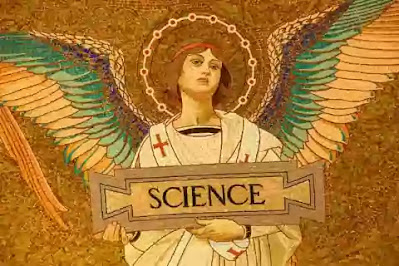Also Read
The two dominant and yet conflicting tendencies of the Victorian age were the spirit of complacency on the one hand and growing unrest on the other. The French Revolution and Romanticism brought as the aftermath a love of stability, order and system in all things. Rules of conduct and religious beliefs had been rudely shaken in the storm of the Revolution. Romanticism had set premium on passion vis a vis reason. The laxity of morals in the reigns of the Georges had to be mended. The insistent need of the accepted standard of strict morality was felt by the nation. Willing submission to authority in matters of religions, politics, literature, social life, etc. became the general rule. This was the Victorian compromise.
 |
| Science and Faith |
To conform to the accepted faiths, rather than question and doubt - this was the intellectual temper of the age. As a corollary to this came the sense of complacency that whatever had been, set up by them was permanent and unshakable. "The Home, the Constitution, the Empire, the Christian religion, each in its own form and degree was taken as a final revelation." To hint that such things might, in the process of change, be superseded or displaced one day was not allowable. This acceptance of the established order bred a spirit of optimism.. "All is right with the world"- these words of Browning gave utterance to the spirit of the age. For a time it went on all well.
But towards the middle of the Victorian period, the new born science made its impact on the intellectual temper of the age. Of course, the average Englishman was not much affected by the spirit of science, which questions, examines and tests everything and accepts nothing on authority or in blind faith. But the finer and more sensitive spirits of the age i.e., the poets and thinkers were deeply affected by it. The rapid advance of science and its momentous discoveries in the sphere of biology and geology transformed their whole outlook on life and the universe. Science which, since the sixteenth century, had been a growing rival force beside religion and art, had now come to hold the supreme sway over the minds of men. Materially science controlled the forces of nature and promoted man's comfort and happiness by its mechanical inventions. But its effect on the inner, the spiritual life of the age was terribly disturbing and unsettling. Darwin's theory of evolution runs counter to the traditional religious belief about the creation of man by God. Even God himself had been tested in the light of reason and found wanting. As the spirit invaded literature, it produced some definite results.
It is most prominent in the poetry of the poets of the sceptical reaction, namely, Arnold, Clough, James Thomson, FitzGerald, etc. The cry over the decay of faith rings in their works, with a poignant note of pessimism which threatens even the will to live, not to speak of the death of joy in life. This Virgilian cry over "the mournful-ness of mortal destiny" is most pronounced in the poems of Arnold Almost all his poems are deeply elegiac in tone. The Scholar Gipsy, Thyrsis, Rugby Chapel, Dover Beach are some of the more remarkable poems of the group. The sea of faith was once at the full but now it has ebbed away, leaving the naked shingles on the coast - this is the prevailing theme of the poems of the agnostic who "is regretful of the vanished faith, regretful of its beauty and regretful of the lost promise." They bring the note of sadness in by wailing over this decay of faith.
Arnold found no shore to stand upon in the tossed sea of faith. Clough, the friend of Arnold, wrote poems which are charged with this deep-seated unrest and despondency. The most famous of his poems in this vein is Dipsychus, a philosophical poem par excellence. James Thomson gives a powerful expression to this in The Hound of Heaven and The City of Dreadful Night. The second poem contains the quintessence of melancholy. "Life is a hell and Progress is an illusion" - this is the main burden of this tremendous poem. Indeed, pessimism can go no farther. This note turned FitzGerald into a fatalist, whose main work is Rubayiat of Omar Khyam. The Pre Raphaelites made a reaction to the Victorian scene of materialism and pragmatism by withdrawing themselves from reality into the world of art. They took up the creed of art for art's sake. There is a cynical note in the choice I (included in the sonnets - The House of Life) of D. G. Rossetti who disparaged the pursuit of gold and science in the Victorian age. The Decadent School of poets in the ninety-eighties is a natural transition from this pre-occupation with cynicism and fatalism bred in the intellectuals of the time.